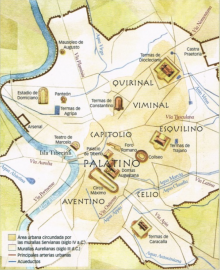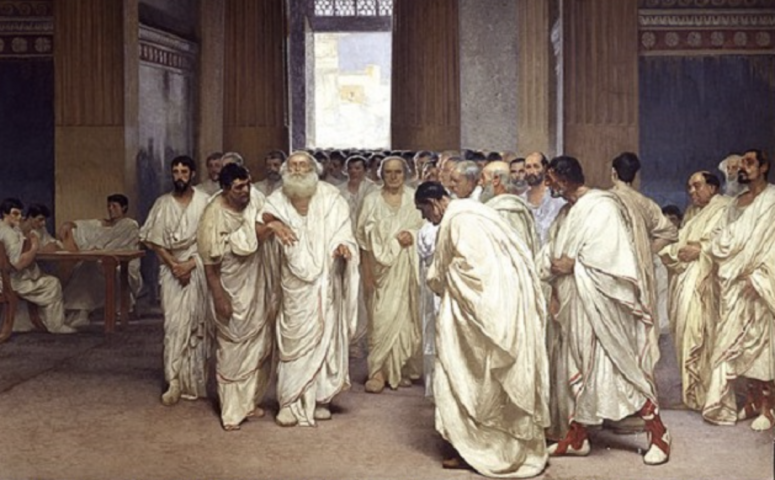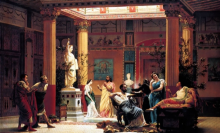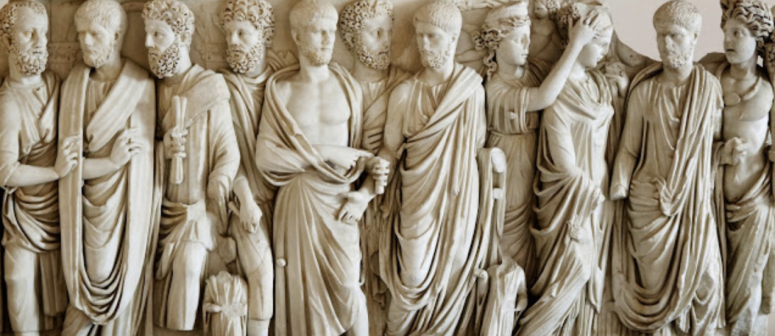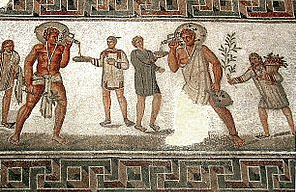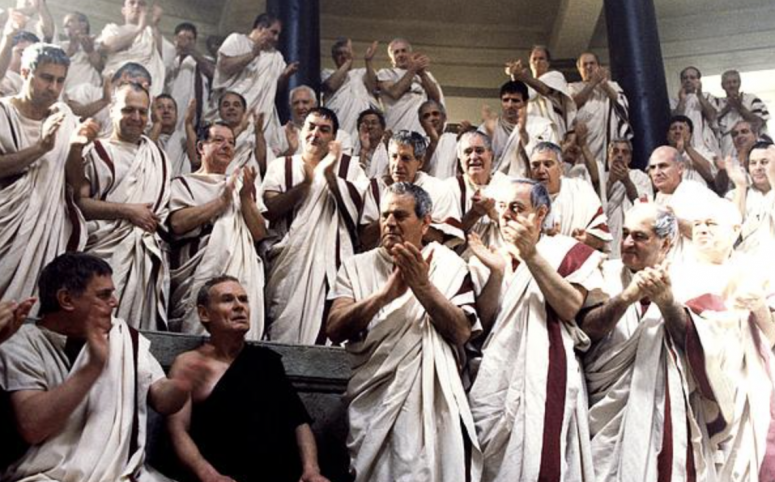Gens
After its founding in 753 BC, Rome was the consideration of Etruscan monarchy, passed later to be a Latin republic (509 BC) and from 27 BC became one of the greatest empires in history.
The first social and political life of the Roman structure was the family, which was formed by the adnati, ie, for all those who, regardless of whether there were links between them blood, were under the power of the pater familias: well considered the agnatic family was part of the father's wife (uxor in manu), children, spouses of children, the children of the sons and unmarried daughters.
Of the group of families who had the same ancestor or common stock, gentile family (gens) curiae (10 gens) and tribes (10 curies) emerged and the grouping of several gens.
It is estimated that the foundation of Rome took place as a result of the union of the tribes of Monte Palatino with those established in the Quirinal. The founders were called patricians (patres), because they were the patres families of those tribes with their families the first inhabitants of Rome.
The patricians were citizens of higher social class and the only ones who held full rights of citizenship (ius civitatis) had the right to vote, the performance of political or religious positions, the allocation of public land, to marry, to a will (testamenti factio), the exercise of other civil rights (guardianship, inheritance) and concluding contracts (although this right was not exclusive to them, as well as corresponding to free people although they were not patricians). The duties, military service and duty to contribute to the maintenance of certain state taxes.
Curiae soon they formed the basis of the city gathered in an assembly (comitia curiata) chaired by the consuls in the presence of a priest (flamen curialis). During the first decades of the Republic, the people of Rome was organized in 30 curiae on the basis of the thirty originating patrician families. The curiata comitia passed laws, elected consuls (the only eligible judges at that time) and resolved legal issues.
The first social and political life of the Roman structure was the family, which was formed by the adnati, ie, for all those who, regardless of whether there were links between them blood, were under the power of the pater familias: well considered the agnatic family was part of the father's wife (uxor in manu), children, spouses of children, the children of the sons and unmarried daughters.
Of the group of families who had the same ancestor or common stock, gentile family (gens) curiae (10 gens) and tribes (10 curies) emerged and the grouping of several gens.
It is estimated that the foundation of Rome took place as a result of the union of the tribes of Monte Palatino with those established in the Quirinal. The founders were called patricians (patres), because they were the patres families of those tribes with their families the first inhabitants of Rome.
The patricians were citizens of higher social class and the only ones who held full rights of citizenship (ius civitatis) had the right to vote, the performance of political or religious positions, the allocation of public land, to marry, to a will (testamenti factio), the exercise of other civil rights (guardianship, inheritance) and concluding contracts (although this right was not exclusive to them, as well as corresponding to free people although they were not patricians). The duties, military service and duty to contribute to the maintenance of certain state taxes.
Curiae soon they formed the basis of the city gathered in an assembly (comitia curiata) chaired by the consuls in the presence of a priest (flamen curialis). During the first decades of the Republic, the people of Rome was organized in 30 curiae on the basis of the thirty originating patrician families. The curiata comitia passed laws, elected consuls (the only eligible judges at that time) and resolved legal issues.
Rome was initially divided into 10 rural tribes and 4 urban tribes (Suburana, Esquilina, Collina and Palatina).
After the conquest of Italy their numbers increased, being fixed in 35 tribes since 241 BC:
Aemilia, Aniensis, Arnensis, Camilia, Claudia, Clustumina, Collina, Cornelia, Esquilina, Fabia, Falerna, Galeria, Horatia, Lemonia, Maecia, Menenia, Oufentina, Palatina, Papiria, Pollia, Pomptina, Publilia, Pupinia, Quirina, Romilia, Sabatina, Scaptia, Sergia, Stellatina, Suburana, Terentina, Tromentina, Velina, Voltina and Voturia.
SOCIAL CLASSES
Roman society, like many other ancient societies, was based on inequality. Historically five classes (patricians, plebeians, slaves, clientes and freedmen) distinguished although the social organization was something changing throughout history.
The Monarchy
Roman society had two large groups of people:
- free citizens: they could be privileged (patricii) and unprivileged, and the last independent (plebeii) or dependent (clients and freedmen).
- slaves (servi).
Patrician. Were members of the first families settled in Rome and their descendants. Each claimed descent from a more or less deified ancestor (pater). Those who had the same pater formed a gens, bore the same name (nomen gentilicium) and held the same cult (sacred gentile).
From the beginning of Rome, the patricians and their families were the first social link. The patricians were at the base of the foundation of the city and therefore were Roman citizens. They had the exclusive public office and led the life of Rome.
Later the right of citizenship was extended to the minores calls people: the inhabitants of Rome without being patricians acquired Roman citizenship and foreigners who come from other cities, renounce their former citizenship and, by invitation, accepted the honorary Rome.
Commoners. They accounted for most of the population of Rome. They were considered free men, but could not participate in political or religious matters.
Clientes. They were usually freedmen who remained under the protection of their former masters or foreign or poor refugees, subject to patronage of a patrician, who gave them financial assistance, he defended them before the law and let them participate in the religious ceremonies of the family in exchange for joining him in the war and cooperate in the work for which the patrician seek their help.
Salutatio matutina was a deeply rooted institution in the Republic and the Principality.
Each morning, the clientes were heading to the house of his employer to wish him a good day and to be offered for what might need when the time came.
On the sidewalk outside the home, they lined up to meet the rite. One after another, arranged not in the order of arrival, but according to their social status and the narrowness and length of their relationship with the patrician. The front, they were greeted; The following were limited to say hello; and the remaining almost always the majority, nor were greeted and saluted. Everyone was there to make visible the power of the master of the house.
Already in the lobby, all received from the hand of the house manager sportula, ie, payment in cash or in kind, by participation in the staging of the ability to influence. After the collection of the service, who were considered suitable for this must accompany the employer in droves animated while attending his public business, escorting, laughing their thanks, giving flattery or applauding when he gave a speech before the courts.
Freedmen. They were the slaves who had been granted freedom (manumissio). Slaves could gain their freedom in different ways: by buying freedom for voluntary concession lives of their owners or by will. To achieve the status of freedman, the slave was not entirely free, but used to retain certain ties of dependency with his former master, under the terms agreed previously:
Obsequium: deference and kindness that should be out of respect or courtesy, consisting of services of various kinds.
Opera: working days, which usually met in the same work that was commissioned as a slave.
Bona: inheritance rights over his assets.
Obsequium: deference and kindness that should be out of respect or courtesy, consisting of services of various kinds.
Opera: working days, which usually met in the same work that was commissioned as a slave.
Bona: inheritance rights over his assets.
The Republic
During the Republic, inequality causes social tensions. The social hierarchy ceases to depend birth or religion and stood in relationship to money and wealth.
The plebs logically grew more than the patricians, because she entered the towns annexed by Rome and the foreigners who came to live in the city. But such a large number of inhabitants was not resigned to be in the public life of comparsa; and it was not profitable than not paying taxes or military service they were not having the status of citizens (cives). The struggle of commoners until the political equality with the patricians was constant:
494 BC. Given the refusal of the patricians to grant political equality, commoners declared a general strike and marched to Monte Sacro. Rome was collapsed and the patricians had to give. The plebians returned with this pact:
You not lose freedom for unpaid debts;
a magistracy (plebis tribunus) will be created with the right to veto decisions of the Senate and those of the other judges;
the legality of an exclusively plebian assembly (concilium plebis) will be accepted.
451-449 BC. the first written legal text (Lex XII Tabularum) be drafted and enacted despite the initial resistance of the patricians. Until then, the patricians dispensed justice according to custom and oral tradition of the ancestors (mores maiorum), which gave rise to many irregularities: commoners were unaware of the rules that could become tried and usually the patricians applied the tradition that suited their interests.
440 BC. The Canuleia Lex et plebis patrum conubio authorizes marriage between patricians and plebeians, which until then had been strictly forbidden.
409 BC. Commoners were first given access to the position of Quaestor.
367 BC. The Liciniae-Law admitted Sextiae access commoners to the office of consul (in 342 the two consuls were plebeians for the first time).
356, 337 and 300 BC. They agreed to dictatorship, censorship, pretura and pontificate (last redoubt of the patricians).
287 BC. The Senate recognized the force of law to decisions of the assemblies of the plebs (concilium plebis) and admitted to prevail over its decisions.
Achieved equal rights, they remained for a long time the great economic differences. Patricians and plebeians rich agreed between them to the detriment of the poor commoners (proletarii), rather than having all political rights, they had no money to eat. Social reforms failed attempt on their behalf with the murder of his drivers: the Tiberio (133 BC) and Gaius Gracchus (121 BC) brothers. In the Republican era, the Roman population distinguished:
Cives: patricians (patricii) and commoners (plebeii).
Non cives: freedmen (liberti) and slaves (servi).
Roman citizenship (ius civitatis) gave the owner a set of rights and obligations was historically coveted:
rights: political, as sufragii ius (right to vote); ius honorum (right to be eligible); sacrorum ius (right to be eligible for priestly functions); provocationis ius (right of appeal to the people in criminal proceedings). Or civilian objects, such as commercii ius (contracts); testamenti factio (test); ius connubii (marriage); ius legis actionis (exercise judicial actions).
obligations: census (obligation to register in the census); militia (obligation to serve in the army during the scheduled time); tributum (obligation to pay taxes).
Cives are among the equites and the senatorial nobility (nobilitas). The cavalry of the Roman army was formed by rich that provided their own horse or horses used state. They formed a distinguished social group (characterized by a gold ring and an embroidered tunic of purple). They were as a wealthy but rarely devoted to political bourgeoisie, where considered contemptuously homines novi (without illustrious ancestors). Equester versus the ordo ordo senatorius or nobilitas formed by patricians and plebeians who had an ancestor in front of a seat magistracy (Consul, Praetor, censor or mayor) was.
Customers came to disappear at the beginning of the Republic absorbed by the rabble, but then reappeared to ruin the middle class wars and the effect of the products that came free to Rome from subject peoples. Many failed to have legal bond with a Patronus and wandered aimlessly Rome, behind the rich or the politician who offered them.
Slaves, however, had great prominence at that time causing major rebellions.
The plebs logically grew more than the patricians, because she entered the towns annexed by Rome and the foreigners who came to live in the city. But such a large number of inhabitants was not resigned to be in the public life of comparsa; and it was not profitable than not paying taxes or military service they were not having the status of citizens (cives). The struggle of commoners until the political equality with the patricians was constant:
494 BC. Given the refusal of the patricians to grant political equality, commoners declared a general strike and marched to Monte Sacro. Rome was collapsed and the patricians had to give. The plebians returned with this pact:
You not lose freedom for unpaid debts;
a magistracy (plebis tribunus) will be created with the right to veto decisions of the Senate and those of the other judges;
the legality of an exclusively plebian assembly (concilium plebis) will be accepted.
451-449 BC. the first written legal text (Lex XII Tabularum) be drafted and enacted despite the initial resistance of the patricians. Until then, the patricians dispensed justice according to custom and oral tradition of the ancestors (mores maiorum), which gave rise to many irregularities: commoners were unaware of the rules that could become tried and usually the patricians applied the tradition that suited their interests.
440 BC. The Canuleia Lex et plebis patrum conubio authorizes marriage between patricians and plebeians, which until then had been strictly forbidden.
409 BC. Commoners were first given access to the position of Quaestor.
367 BC. The Liciniae-Law admitted Sextiae access commoners to the office of consul (in 342 the two consuls were plebeians for the first time).
356, 337 and 300 BC. They agreed to dictatorship, censorship, pretura and pontificate (last redoubt of the patricians).
287 BC. The Senate recognized the force of law to decisions of the assemblies of the plebs (concilium plebis) and admitted to prevail over its decisions.
Achieved equal rights, they remained for a long time the great economic differences. Patricians and plebeians rich agreed between them to the detriment of the poor commoners (proletarii), rather than having all political rights, they had no money to eat. Social reforms failed attempt on their behalf with the murder of his drivers: the Tiberio (133 BC) and Gaius Gracchus (121 BC) brothers. In the Republican era, the Roman population distinguished:
Cives: patricians (patricii) and commoners (plebeii).
Non cives: freedmen (liberti) and slaves (servi).
Roman citizenship (ius civitatis) gave the owner a set of rights and obligations was historically coveted:
rights: political, as sufragii ius (right to vote); ius honorum (right to be eligible); sacrorum ius (right to be eligible for priestly functions); provocationis ius (right of appeal to the people in criminal proceedings). Or civilian objects, such as commercii ius (contracts); testamenti factio (test); ius connubii (marriage); ius legis actionis (exercise judicial actions).
obligations: census (obligation to register in the census); militia (obligation to serve in the army during the scheduled time); tributum (obligation to pay taxes).
Cives are among the equites and the senatorial nobility (nobilitas). The cavalry of the Roman army was formed by rich that provided their own horse or horses used state. They formed a distinguished social group (characterized by a gold ring and an embroidered tunic of purple). They were as a wealthy but rarely devoted to political bourgeoisie, where considered contemptuously homines novi (without illustrious ancestors). Equester versus the ordo ordo senatorius or nobilitas formed by patricians and plebeians who had an ancestor in front of a seat magistracy (Consul, Praetor, censor or mayor) was.
Customers came to disappear at the beginning of the Republic absorbed by the rabble, but then reappeared to ruin the middle class wars and the effect of the products that came free to Rome from subject peoples. Many failed to have legal bond with a Patronus and wandered aimlessly Rome, behind the rich or the politician who offered them.
Slaves, however, had great prominence at that time causing major rebellions.
The Empire
Augustus remained hierarchy based on wealth. It distinguished between:
Cives: honestiores are divided into (well-off) and humiliores (poor). Within the first, they are those belonging to the ordo ordo senatorius and equester.
Non cives: freedmen (liberti) and slaves (servi).
The ius civitatis that already in 88 BC was granted to the Italians, was expanded in 212 AD to all free men of the Empire, to solve fiscal and military problems that Rome had. Be a citizen ceased to be important and, incidentally, disappeared the privileged position of Rome and Italy in the Empire.
Augustus reformed the ordines, placing in the ordo senatorius citizens with more than one million sesterces (played republican magistracy and wore red sandals and robes laticlavia, showing from Marco Aurelio clarissimi title); and the ordo equester who had 400,000 (played new positions, as prefect or procurator, dressed angusticlavia robe and golden ring, showing from Marco Aurelio title egregii).
Cives: honestiores are divided into (well-off) and humiliores (poor). Within the first, they are those belonging to the ordo ordo senatorius and equester.
Non cives: freedmen (liberti) and slaves (servi).
The ius civitatis that already in 88 BC was granted to the Italians, was expanded in 212 AD to all free men of the Empire, to solve fiscal and military problems that Rome had. Be a citizen ceased to be important and, incidentally, disappeared the privileged position of Rome and Italy in the Empire.
Augustus reformed the ordines, placing in the ordo senatorius citizens with more than one million sesterces (played republican magistracy and wore red sandals and robes laticlavia, showing from Marco Aurelio clarissimi title); and the ordo equester who had 400,000 (played new positions, as prefect or procurator, dressed angusticlavia robe and golden ring, showing from Marco Aurelio title egregii).
